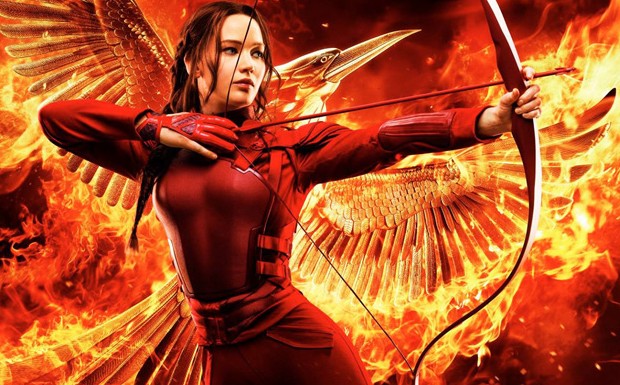Warning: the following review contains spoilers from both the book and the movie, so read at your own discretion.
Although the last movie in the Hunger Games franchise, Mockingjay: Part 2, may not mark the end of an era, it does mark the end of what I believe to be the best translation of a book series onto the big screen. With inspired direction, effects, makeup, and cinematography that really flesh out the world of Panem, and an incredibly talented cast (who knew Jennifer Lawrence would win two Oscars while filming some of the highest-grossing movies of all time?), watching these novels come to life has been a satisfying journey. The Hunger Games movies strike the perfect balance between faithfulness to the source material and artistic license that is so rare in book adaptations. While many adaptation writers confuse artistic license with “let’s add stuff we think looks cool and throw logic to the wind,” (I’m still reeling from the fifth season of Game of Thrones, and even years later can’t forgive the tragedies that befell Harry Potter and the Half Blood Prince) the changes made here have mostly expanded and illuminated the gritty world that author Suzanne Collins created instead of undermining it. It would be so easy for the filmmakers to make Mockingjay the ending that everyone wants, but instead, they make it the ending that we need.
Mockingjay: Part 2 picks up where the last movie left off with all the exciting events you remember from the book. The first two-thirds of the movie builds up really good suspense that had me on the alert. There is constant momentum, but also much-needed dramatic breaks. The acting is excellent as per usual, not only from the main cast, but from the supporting cast as well. Pollux (Elden Henson), could have easily been a forgettable character, but he has a few emotional moments that wordlessly convey the gravity of the situation they’re in. Sadly, some of your favorite regulars like Haymitch, Effie, Caesar Flickerman, and Plutarch aren’t in many scenes, but they shine when they are. I choked up when Haymitch reads a letter to Katniss from Plutarch where he says he wish he could be there in person; with the loss of Philip Seymour Hoffman, this really hits hard. There is also a small surprise near the end that I will not spoil (but because I’m a cheeky bastard, I’ll give you a hint: it’s shipping related).
Although I’m glad the final installment doesn’t change a lot from the book, the problems that plague the source material are even more problematic here. Prim’s death still feels abrupt, and the movie does not explain her involvement with the medical corps, so viewers may be confused as to why she is helping Capitol refugees. While the sisters share a gut-wrenching embrace before Katniss goes on her mission, I felt that Katniss needed to have more time to react Prim’s sudden presence on the battleground before she gets killed for the realization to fully sink in.
Another problem is that Peeta’s presence feels shoehorned—why would someone who could only be a liability be allowed on a special task force? It’s hard to believe that a mentally unstable Peeta could make it out of a traumatic situation less emotionally scarred than he was to begin with. At this point, the love triangle between Katniss, Peeta, and Gale also feels shoehorned. Despite being a very hot boy, it’s obvious that Gale doesn’t stand a chance against Peeta, and he obnoxiously reminds us of that in half of his scenes. I cringed when the boys compared their experiences making out with Katniss while she was merely feet away, trying to sleep on an assassination mission in a sewer. Some people need to sort out their priorities.
And then there’s the last third of the movie. The ending has been a source of contention among Hunger Games fans since the book series ended. Many felt that it was underwhelming, anticlimactic, abrupt. Others argue that a bombastic ending that glorified revenge and violence would go against the underlying message of the series. I used to be of the former opinion, but now after seeing the movie, I may have to reevaluate. The series needs to end with Katniss coming to the realization that revenge will only perpetuate a society where no one is truly free. As a horrified Katniss watches hundreds of Capitol refugees, many of whom are children, get blown up by her own forces, she has to confront some hard truths about herself, what she believes she’s fighting for, and who the enemy really is. Considering the violence and corruption plaguing the world today, perhaps the ending makes Hunger Games fans uncomfortable because it forces us to do some soul-searching about our situation as well. We want to see the glamour of the “games,” the drama of the love triangle that just won’t go away, and even a freaking theme park. Perhaps we’re not as different from the Capitol as we think, and that’s exactly why Mockingjay needs to end the way it does.
Header image via comingsoon.net


